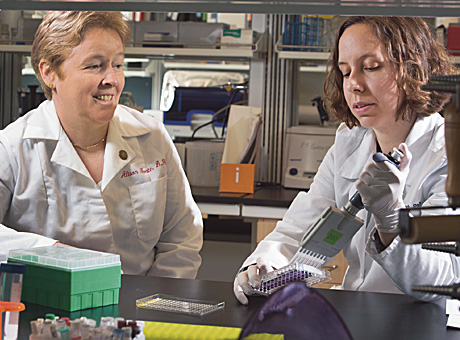
Alison Goate, PhD, left, who studies protein aggregation and neurodegeneration, with postdoctoral student Celeste Karch.

Alison Goate, PhD, left, who studies protein aggregation and neurodegeneration, with postdoctoral student Celeste Karch.
Brain diseases such as stroke, Parkinson’s disease, multiple sclerosis, amyotrophic lateral sclerosis (ALS), and Alzheimer’s disease are among our nation’s most significant health problems, affecting 50 million Americans. More research is needed if we are to treat these illnesses more effectively and someday even prevent them.
“I would not be here if medical research had not extended my life,” says William H. Danforth, MD, vice chairman and chancellor emeritus of Washington University. “I have a personal reason to be grateful. And so do many others.”
As science continues to shed new light on old problems, sometimes one disease, such as cerebral palsy, can be seen as part of a family of diseases — in this case, neurodegenerative diseases.
If that group of diseases is then studied by a multidisciplinary group of researchers, the collaborative effort could result in more rapid scientific breakthroughs focused on prevention and treatment.
“It makes sense for more scientists and physicians to come together around common central facilities and databases for a family of diseases rather than a single disease,” says Danforth. “They can draw more effectively from diverse fields such as genetics and immunology.”
“We have the right world-leading scientists, with the right vision, and the right infrastructure, to mount an attack on these crippling diseases.”
— WILLIAM H. DANFORTH, MD
Washington University School of Medicine is leading a collaborative effort to prevent, diagnose and treat a wide range of neurodegenerative diseases. The Hope Center for Neurological Disorders was established in 2004. The center brings together more than 500 world-class scientists in a collaborative environment with the goal of rapidly translating basic scientific discoveries into direct patient care.
The School of Medicine needs your help to escalate research into neurological disorders. A generous gift of $10 million from the Danforth Foundation is leading the way and encouraging others to consider important endowment commitments to support research at the Hope Center.
“The Hope Center puts together the right world-leading scientists, with the right vision, and the right infrastructure, to mount an attack on these crippling diseases,” says Danforth. “The challenge for us all is to join the Hope Center in the pursuit of this noble cause.”